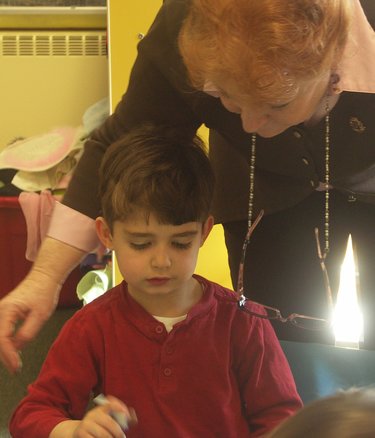Lottery process for state-paid pre-K spots needs revision, super says
GUILDERLAND — The parents of over 160 preschoolers in Guilderland applied for 110 spots so a lottery determined which would attend pre-kindergarten classes next fall for free.
A kindergarten class in Guilderland typically numbers about 300 students.
The process was difficult for both the school district and parents as well as the preschools, said Superintendent Marie Wiles, and she hopes some legislative or policy changes will be made statewide before next year.
Guilderland was surprised two years ago when the state awarded the suburban district $660,000 to start a pre-K program, guaranteeing funding for two years. This year, Guilderland received $300,000 more, or just under $1 million.
“The problem is we don’t have the spaces for more children,” said Wiles, so some of the money may not be used.
Wiles said that a number of districts, which couldn’t find spaces at all, did not accept the state funds.
Last year, Guilderland got just two responses to its request for proposals and contracted with both St. Madeleine Sophie School, and Kidz Korner Child Care & Learning Center.
This year, two more preschools responded — All Saints Catholic Academy and Christ the King Early Childhood Center — and Guilderland contracted with all four providers.
“We were delighted to have additional providers because that means we could fill additional spots,” said Wiles.
The district will pay each of those programs $540 per month per child, or $5,400 per pupil for the school year, from the state funds.
Asked if Guilderland would consider hosting its own program with its own faculty, Wiles said, “We don’t have space in our own buildings.” A capital project would be required to build new classrooms, said Wiles, noting that the district is currently in the middle of two earlier projects.
“I’m not sure the state’s pre-K funding would cover school district costs,” she went on, noting the pay scale for Guilderland school district teachers is much higher than for teachers at the preschools.
Problems
Problems arose with the lottery because some parents had already enrolled their children in preschool.
“Under the law, families can’t have their children grandfathered into a placement where they had already technically agreed to pay,” said Wiles. “The only way the district can allocate spots is through a lottery.”
She went on, “So it creates a really challenging set of circumstances, both for the school district and the provider and also for the families.”
Guilderland communicated with parents, asking them their preferences for choice of preschool programs; not all the preferences could be met.
In that case, parents could decline the lottery spot to keep their child in the preschool where he or she was already enrolled.
“But then it means that they’re going to not be accessing the free program,” said Wiles. “So it’s really super complicated.”
She said the state needs to do a lot of work at the legislative and regulatory level “to help folks who fund these programs understand that they are not really working as intended.”
Guilderland could have said, “This is too complicated. We’re just going to send the money back,” said Wiles.
She went on, “There are neighboring districts who did just that, but we decided to try our very best to get this program up and running and to get as many children as possible into quality pre-K programs without a cost to the family.”
Another aspect of the current program that Wiles finds worrisome is that the funding is not allocated on the basis of need. It’s strictly the luck of the draw.
“Some of our most needy families may not have access to it because they weren’t selected in the lottery,” said Wiles. “And that’s philosophically, you know, worrisome.”
Some parents raised concerns because three of the four preschool programs were church-connected.
Wiles said the pre-K program is five hours long, running from 8 a.m. to 1 p.m. each school day. “Any religious education or religious reference all has to take place outside of those five hours,” she said.
Parents may choose to self-pay to have their children cared for — for example if their own work day extends after 1 p.m. — for a longer day at the preschool. The preschool can then make religious references in the later part of the day.
Wiles concluded, “We really do understand how frustrated our families are because it is a complicated process … But we are committed to trying to make it work. Hopefully, we can get some legislative and regulatory relief in the not-too-distant future so future iterations of this are smoother, more equitable, and not as chaotic. But that’s an ask.”



